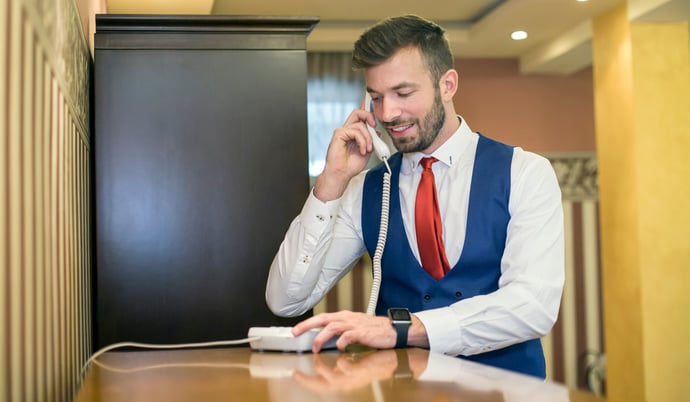
A VoIP phone system is the most modern and sophisticated option for your hotel’s communications. But like any internet-connected device, a VoIP network is susceptible to external breaches from hackers interested in fraud or theft. In 2017, telecom organizations and carriers lost a collective $29.2 billion to fraud. As cyber-attacks have become more prominent, the need for carriers and businesses to defend against external threats has grown.
If your hotel is equipped with a VoIP system, ensuring system security is paramount to protecting your guests’ calls, their financial data, and your hotel’s internal communications. Here’s what to keep in mind to make sure your network is safe.
Protect Your Credentials
Ensuring both your username and password are protected is essential to maintain your network integrity. According to HowTo Geek, a strong password is at least 12 characters and includes numbers, special characters, capital letters, and lowercase letters. It’s also recommended to create a unique password for network access that is not being used across other personal or company accounts.
At an organizational level, ensure that every employee has their own login credentials, and set a strict policy that no employee will use another’s credentials to log in. When an employee is hired or terminated, make sure that their credentials are revoked as quickly as possible. You should also require every employee to change their passwords on a standard cadence, every six months to a year, in the event there’s ever a lapse in security.
Enable Network Address Translation
Network Address Translation (NAT) is a feature of internet routers that gives each of your devices a unique IP address that can’t be seen by the outside world. If hackers can’t see the IP address of a device like a phone, it’s much more difficult to control it.
If you’re not already doing so, enable the NAT feature of your network routers. Hackers can use automated programs to find network endpoints that aren’t protected behind a NAT. When they gain access, they might be able to ring the phone remotely, turn on the speakerphone to listen to whoever’s at the other end, or place calls from that number that look like they’re coming from inside your hotel. Private IP addresses are vital for avoiding this loophole.
Port 80 Vulnerability
Routers use ports to direct traffic to and from the internet, numbered from 0 to 65535. All ports between 0 and 1024 are set aside for specific purposes already, and some of them are more vulnerable to attack than others.
Specifically, port 80 handles HTTP traffic. HTTP traffic is unencrypted, which means that hackers might be able to access your hotel’s internal network as though it was any other website. Turning off port 80 will prevent these types of breaches from occurring.
Talk to Phonesuite
If you’re ready to bring your hotel’s communications system into the 21st century, you need a VoIP system. Compared to an analog system, a VoIP system offers far more versatility, better support, lower cost, and more adaptability to a changing environment and future regulations.
If you’re ready to get started and you’re curious about the cost, talk to Phonesuite today. We’ll build a custom quote for your hotel’s exact specifications and needs so you can choose the system that’s best for you.

